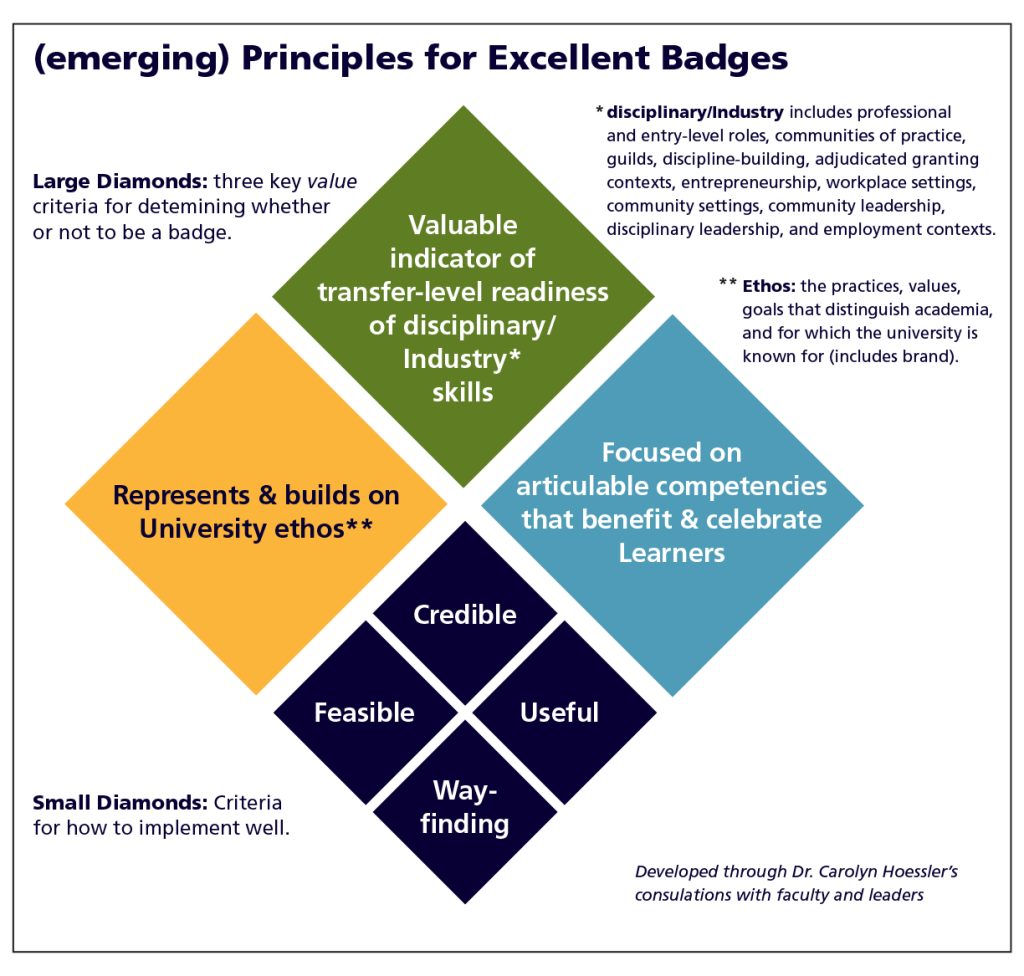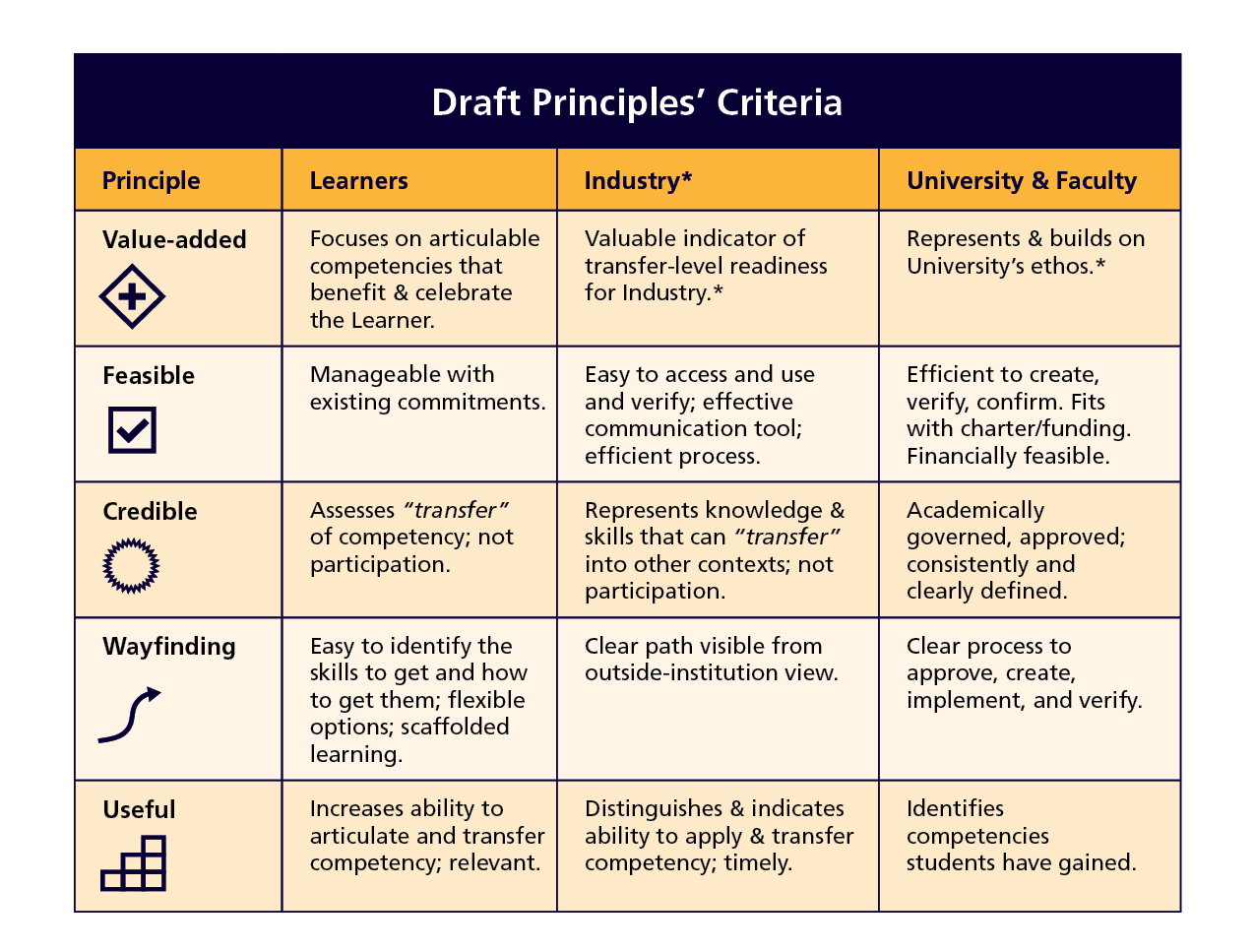6 Faculty and Cross-Campus Collaboration
![]() In addition to industry and employer collaboration, there also needs to be significant collaboration among inter- institutional departments. Therefore, to ensure that micro-credentials are implemented effectively within an institution, each department lead must be present and part of the delivery phase of micro-credentials. It is important to acknowledge that each department has its own internal processes and operations, and if these are not communicated early on, key deliverables of the overall project may not be met, creating a negative ripple effect in other departments.
In addition to industry and employer collaboration, there also needs to be significant collaboration among inter- institutional departments. Therefore, to ensure that micro-credentials are implemented effectively within an institution, each department lead must be present and part of the delivery phase of micro-credentials. It is important to acknowledge that each department has its own internal processes and operations, and if these are not communicated early on, key deliverables of the overall project may not be met, creating a negative ripple effect in other departments.
To develop a micro-credential or not?
When working through questions like those in the checklist below, you may find yourself wondering whether or not a micro-credential is a good fit for you and your organization. Ontario Tech has designed a process to help guide this decision-making and shape micro-credential development.
(Emerging) Principles for Excellent Badges

Draft Principles’ Criteria

Questions for faculty and cross-campus collaboration
The following checklist can be used to approach the development of micro-credentials. The questions apply to the various aspects of through faculty and cross-campus collaboration.
Questions that everyone on the micro-credential development team
- Is this really something we want to be doing over time?
- Do we have the right team here to be making this decision? Are there other people we should be talking to? (See the textbox “Members of a micro-credential design team” in chapter 3.)
- Are there other people on campus already doing this kind of micro-credential? Are we duplicating? Are we duplicating something already in an existing course?
- If we recognize that another institution is doing this, should we be doing it? Is there enough of a market?
- Are we doing something different?
- Do we have the necessary institutional policies in place to support this work?
Questions on collaborating with industry-employer partners
- Have we found the right partner or is this just the partner we found?
- Is this the best use of our extra time? Will the project we’re going to get match our goals for doing this in the first place?
Questions on how collaboration is being approached
- Have we created a situation where our post-secondary partners are going to be rewarded for their work?
- Are we going to continue to facilitate this work or are we handing off the project management to the faculty subject matter expert (SME)?
Questions about developing content
- Can we repurpose existing content?
- Who owns the content? What does the license allow?
- Where will it be hosted?
- Who will have final decision on content?
- What quality assurance processes are in place?
- Are their individuals at our institution who can assist with instructional design, media development, and editing?
Questions about project management protocols:
- Has administrative ownership been articulated end to end from market analysis to development, recruitment to badge issuance?
- Is there a project management tracking process in place for major milestones and risks?
- Are their controls to manage scope creep?
- Is the project sustainable, with ongoing administrative and academic staff/instructor resourcing?
Questions related to recognition
- Have all governance requirements specific to the institution been addressed?
- Is a badging/credential issuing platform available on an ongoing basis?
- Does the badge align with institutional, provincial frameworks and practices?
Tools to support faculty and cross-campus collaboration
Hasson Plattner Institute of Design (2022). Tools for taking action. Stanford University. https://dschool.stanford.edu/resources
Lethbridge College (2021). Micro-credential Development Handbook. https://learninginnovation.ca/wp-content/uploads/2021/08/LCmicro-credentialHandbook_2021.pdf
Future directions for faculty and cross-campus partnerships
- Develop a faculty-friendly project charter that explains what the total cost of this project is in terms of time and effort (see the project charter template in the next section).
- Consider how faculty will be recognized for their contributions under tenure and promotion. Is this service and teaching? Is it one or the other?
- Optimize possible collaboration between continuing education and other departments or faculties. Collaborative workflows can help reduce repetition of existing full-term courses with an eye to also leveraging micro-credentials as a pathway into full-term programming or building an alumni network of continuous learners.

